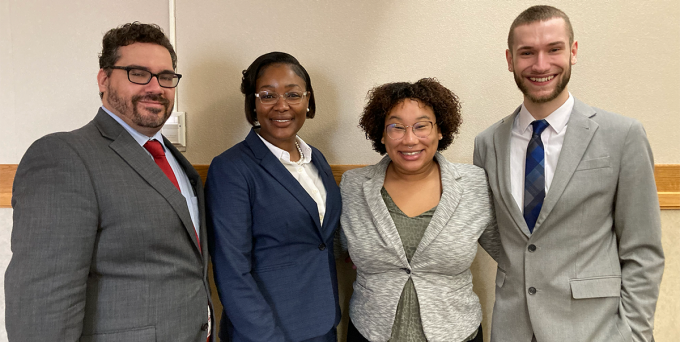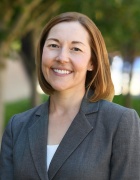
CLARO volunteer Nicholas Ramirez ’22, supervising attorney Paulette Campbell ’12, student attorney Glenaida Garlock ’24, and CLARO paralegal George Burkett.
Tackling the consumer debt crisis as a civil rights issue
Consumer debt has become an epidemic. Since the 1960s, household debt has skyrocketed and a highly profitable debt-buying industry has emerged. Debt buyers use the courts to collect debts, often securing default judgments, which are orders issued without the borrower present. In many cases, these judgments are entered in error, and the borrower does not learn about it until years later when a garnishment shows up on their pay stub. When borrowers do get notice, they rarely have legal counsel or know their rights.
The UB School of Law’s Civil Rights and Transparency Clinic has formed a new community partnership to counsel clients through the anxiety-inducing process of disputing debt. The Clinic, directed by Professor Heather Abraham, is working with the Western New York Law Center’s free legal clinic known as CLARO, the Civil Legal Advice and Resource Office. On Tuesday evenings, UB Law students take turns working with low-income clients who visit the East-Side Frank E. Merriweather, Jr. public library seeking help. Typically, clients have received notice of default on a debt or notice of garnishment—big trouble for people living paycheck to paycheck. Under the supervision of practicing attorneys, the students assess their situation, review the legal options, draft motions, respond to discovery requests, and appear in Buffalo City Court seeking to vacate judgments or stay proceedings.
The collaboration is funded by a new grant from the American Association of University Women. Professor Abraham says it aligns with the Clinic’s civil rights mission. “Our partnership recognizes the civil rights aspects of debt collection law and predatory practices in this country, particularly because women and people of color are disproportionately affected by predatory debt collection practices,” she says. The AAUW grant also funds a transgender and gender non-conforming name change legal assistance program, in collaboration with BestSelf Behavioral Health and Neighborhood Legal Services.
Paulette C. Campbell ’12, CLARO’s managing attorney, also sees the disproportionate effects of debt collection in terms of economic class. Her agency serves mostly low to middle income clients, ensuring that their rights are protected in a broad range of consumer debt issues including credit card debt, crippling student loans, overwhelming medical bills, and car loan defaults resulting in repossession.
The need is great, and the UB Law student attorneys are stepping up where it’s greatest, she says. “It’s really beneficial for our program to have this staffing,” Campbell says. “These are really knowledgeable law students. We get a lot of visitors on Tuesday nights, and we’re always looking for students and volunteer attorneys.”
Further, she says, there’s nothing like working with real clients to develop student skills in serving people in crisis. “The clients are going through a traumatic time in their life,” Campbell says, “and being able to counsel them through those experiences is so important. It’s a real skill to be able to empathize with a client and explain the law in a way they can understand.”
Second-year student Glenaida Garlock ’24, enrolled in the Civil Rights and Transparency Clinic, has found the experience formative. For one thing, she says, it’s an opportunity to apply what she has learned about trauma-informed lawyering, which emphasizes non-judgmental, empathetic communication. “You have to be conscious of what people have been through,” Garlock says. “You ask what has happened, with the understanding that no matter what they’ve done, they’re a victim of something. It’s really important to take all that into consideration and let the client know they’re in a safe space.”
As for the help they can offer, Garlock acknowledges that some of the debts may be legitimate. But it’s the student attorney’s job to advocate, often by looking at whether the law governing debt collection has been scrupulously followed. For example, she says, a process server may have rung the doorbell and handed his paperwork to a person without confirming their identity, which may not stand up in court. Additionally, many debt-buyers do not have proof of the chain of ownership of the debt, which often is broken when collectors purchase bad debt for pennies on the dollar.
Garlock adds that the work has fed the ambition that led her to law school: the wish to make a difference. “It has been so worthwhile,” she says. “It’s so simple to be there in the community, making tangible change. I’m an activist, and being at the ground level, getting to connect with people, just means so much to me.”
